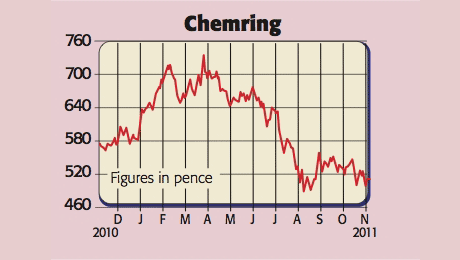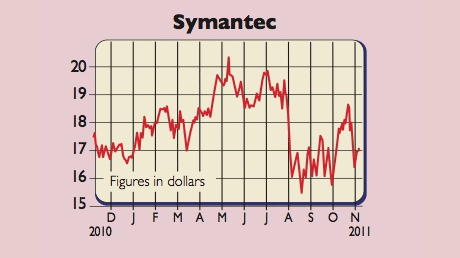Get the latest financial news, insights and expert analysis from our award-winning MoneyWeek team, to help you understand what really matters when it comes to your finances.
You are now subscribed
Your newsletter sign-up was successful
Want to add more newsletters?

Twice daily
MoneyWeek
Get the latest financial news, insights and expert analysis from our award-winning MoneyWeek team, to help you understand what really matters when it comes to your finances.

Four times a week
Look After My Bills
Sign up to our free money-saving newsletter, filled with the latest news and expert advice to help you find the best tips and deals for managing your bills. Start saving today!
1. Chemring (LSE: CHG), rated a BUY by Finncap
Chemring is the world's biggest maker of decoys and flares that are used to protect military aircraft from enemy missiles. Its products are best in class and enjoy a 47% market share. That means they tend not to compete solely on price and earn excellent margins.
Allied troops are being pulled out of Iraq and Afghanistan, which means fewer helicopter missions, yet Chemring's chief executive, David Price, is bullish about the prospects for the under-penetrated naval and fighter-jet sectors. There's also plenty of scope for growth in booming non-Nato countries. These include the Middle East and India, which already account for 24% of sales.
MoneyWeek
Subscribe to MoneyWeek today and get your first six magazine issues absolutely FREE

Sign up to Money Morning
Don't miss the latest investment and personal finances news, market analysis, plus money-saving tips with our free twice-daily newsletter
Don't miss the latest investment and personal finances news, market analysis, plus money-saving tips with our free twice-daily newsletter
Meanwhile, Chemring's munitions arm should remain relatively unscathed by the government's budget cuts. Indeed, volumes are steady and predictable as Chemring's products are used up in either training or on the battlefield. Customers "tend to buy the consumables and keep topping up in little batches," says Price. The division also has the operational flexibility to respond to urgent customer requests. For instance, in less than 12 months, it developed a smoke grenade for the army, got it approved by the MoD, and ramped up production to 150,000 units per month.

Prospects are also good for its more capital-intensive products, such as bomb-detection equipment. "The problem of dealing with insurgents is that they are extremely innovative," says Price. "Every two years you're forced to upgrade [the hardware]." The firm's ground-penetrating Niitek radar, which is fixed to an armoured truck to detect landmines, is selling well.
Third-quarter revenues jumped 9% on a like-for-like basis. That's pretty impressive considering the industry was badly affected by Congress's protracted debate over lifting the US's debt ceiling in August. Additionally, the £996m backlog provides nearly 100% cover for this year's production targets. It includes September's prestigious $150m award to manufacture a "self-contained, one-shot, expendable linear demolition charge" for the Americans. That's a device that can safely clear a path through anti-personnel mines and dense barbed wire.
The City is forecasting 2011 turnover and underlying earnings per share (EPS) of £800m and 59.0p respectively, rising to £915m and 67.3p in 2012. That puts on the stock on a price/earnings (p/e) ratio of less than nine, with a 2.2% dividend yield. I value Chemring on a ten times earnings before interest, tax and amortisation (EBITA) multiple. After adjusting for net debt of £305m and a £22m pension deficit, that delivers an intrinsic worth of 610p a share.
Watch out for a pre-close trading statement on 18 November. Finncap has a price target of 780p.
Rating: BUY at 510p
2. Symantec (Nasdaq: SYMC), rated a BUY by Macquarie
Everyday there are now an estimated 50,000 online hacking attacks. Many are allegedly perpetrated by the Chinese military and Russia, who have set up hundreds of trained militia dedicated to industrial espionage. The British government believes this costs the country £27bn each year.
As tablet and smartphone use soars, more internet breaches are bound to follow. Research house Canalys predicts mobile security spending will rocket 40% a year from $760m in 2011 to $3 billion by 2015. In the past 12 months alone, the volume of Android malware has exploded by 400%.
This is where Symantec comes in. It is the world's largest independent vendor of security, authentication and storage software under its three flagship brands. The first is the Norton anti-virus application that protects PCs, servers and mobiles against internet worms, spam and cybercrime. The second is the Verisign Trust product, which certifies websites and enables users to confidently and safely purchase goods online. The third is its IT backup (Veritas) and eDiscovery (Clearwire) software, which allow companies to securely and efficiently archive, restore and interrogate their mission-critical' data.

Symantec's main rivals include IBM, EMC, Kaspersky, Autonomy and McAfee. The latter was snaffled in 2010 by Intel for $7.7bn in cash equivalent to three times sales and 13 times adjusted earnings before interest, tax and amortisation (EBITA). Symantec could be the next in line in this consolidating industry especially as it owns 1,200-odd patents and generates 39% of its revenues from ongoing subscriptions.
Most of the world's one billion computers already run some form of anti-virus software. By 2020, there could be another 50 billion internet-connected gadgets, including TVs, cars, medical devices and cash machines. Nearly all of them will need some sort of protection. In fact, mobile phones already account for 4% of Symantec's consumer revenues and this is expected to grow quickly in line with deals such as the one struck by AOL recently, whereby it provides security and back-up to all its paid subscribers.
Wall Street is forecasting 2011 turnover and underlying earnings per share (EPS) of $6.7bn and $1.62 respectively, rising to $6.9bn and $1.80 in 2012. On this basis, I value Symantec on a ten times EBITA multiple. Adjusting for the $241m in cash, that suggests an intrinsic worth of $23 a share.
With the number of potential end users expanding rapidly, Symantec's high renewal rates and excellent products are well placed even in the face of some big economic headwinds and potential new entrants such as Microsoft. UK investors need to factor in foreign exchange as well, since 55% of revenues are derived from North America.
Macquarie has a $24 price target. Quarterly earnings are scheduled for 25 January.
Rating: BUY at $17.00
Get the latest financial news, insights and expert analysis from our award-winning MoneyWeek team, to help you understand what really matters when it comes to your finances.
MoneyWeek is written by a team of experienced and award-winning journalists, plus expert columnists. As well as daily digital news and features, MoneyWeek also publishes a weekly magazine, covering investing and personal finance. From share tips, pensions, gold to practical investment tips - we provide a round-up to help you make money and keep it.
-
 Can mining stocks deliver golden gains?
Can mining stocks deliver golden gains?With gold and silver prices having outperformed the stock markets last year, mining stocks can be an effective, if volatile, means of gaining exposure
-
 8 ways the ‘sandwich generation’ can protect wealth
8 ways the ‘sandwich generation’ can protect wealthPeople squeezed between caring for ageing parents and adult children or younger grandchildren – known as the ‘sandwich generation’ – are at risk of neglecting their own financial planning. Here’s how to protect yourself and your loved ones’ wealth.

